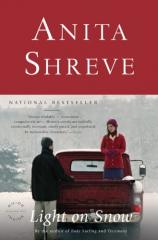Light on Snow
Review
Light on Snow
This is a book to read when a blizzard is coming, you're fixed
cozily under a quilt, and you know there's enough milk in the house
for a couple of days. LIGHT ON SNOW, Anita Shreve's latest novel,
isn't comforting, exactly --- it's a tale of grief and loss, more
like hot, bitter green tea than cocoa --- but it is wonderfully
absorbing. The wintry New England landscape parallels the physical
and emotional isolation of her father-and-daughter protagonists,
and her writing, spare and unshowy, has near-perfect pitch.
Twelve-year-old Nicky Dillon (short for Nicole) and her father,
Robert, are snowshoeing along on a walk in the woods when they find
an abandoned baby in the snow, a girl. They rush her to the
hospital, and her life is saved. But the major emotional event of
the story has occurred before the book even begins, for Nicky and
Robert are outsiders both by virtue of their location (the
farmhouse they live in is at the end of a long, badly rutted road)
and because of the car accident that killed Nicky's mother and her
baby sister, Clara, three years ago. In a series of flashbacks, we
become acquainted with the family, before and after. One day Nicky
was a normal kid in Westchester; the next, she was moving with this
grim, silent man to an old New Hampshire farmhouse.
The symmetry is inescapable --- one child lost; another rescued ---
and it is not lost on Nicky. She mourns partly through fantasy,
imagining what Clara would be like if she were still growing; she
also pictures what would happen if she and her father adopted the
baby they found in the snow. Robert, however, remains almost
unreachable in his grief: "[It] has no texture now --- no tears, no
ache in the throat, no rage," Nicky observes, watching him in his
workshop in the barn (a former architect, he makes limited-edition
furniture). "It is simply darkness, I think, a cloak that sometimes
makes it hard for him to breathe."
Nicky is very much on her own; except for Christmas, when her
grandmother comes to take care of them for a few days, she accepts
that she must be the one who remembers to buy food or reminds her
father to shave and wash his hair. At the same time, she yearns not
only for her mother and sister, but also for a sense of normality:
They have no TV, they don't read newspapers; they eat in the den,
on trays; people rarely come to the house. Nicky goes to school,
reads, knits and makes bead jewelry, and works on the mural of
mountains that she is painting on her bedroom wall. She is an
entrancing character, weirdly grown-up, yet also a kid who wants
Drake's cakes, Ring Dings, 20 colors of nail polish --- and a woman
to confide in.
Enter Charlotte, a young woman who comes to the house claiming to
be a customer for Robert's furniture but who soon confesses that
she is the mother of the baby they found --- she has read about the
rescue in the newspaper and is desperate for news of her daughter.
A blizzard traps Charlotte in the house, and gradually we learn the
truth behind the horrifying discovery in the snow. In this respect,
the book is a bit of a suspense novel, an imaginative
reconstruction of what might lie behind those lurid newspaper
headlines about teenagers dumping their unwanted infants in the
garbage. Shreve maintains the tension well, making us curious to
know the exact nature of the parallel tragedies that afflicted
Charlotte and the Dillon family, letting out the answers a little
at a time.
But it is on a deeper level that the book really succeeds. With
Charlotte's presence in the Dillon house, we see Nicky's profound
hunger for a friend. Although Charlotte is nearly as crushed by
despair and regret as Robert, she is also younger and more
resilient, and she responds to Nicky's obvious need. Emotional
possibilities open up: "My father and I are technically a family,"
Nicky muses, "but it's a word neither of us would ever use. Yes, we
are father and daughter, but because we were once members of a
family that was torn apart, we think of ourselves now as half a
family or a shadow family. As we sit there with our trays on our
laps, however, I feel, or perhaps only imagine, a 'family'
consisting of my father, Charlotte, and me." Perhaps it is only
when a family is destroyed and must rebuild itself that we become
aware of what it means to have one.
Shreve is a prolific writer and an impressively consistent one: Her
popular books (THE PILOT'S WIFE was an Oprah Book Club selection)
are very, very good, compulsively readable, and full of characters
who have real quality and dimension. I believed wholeheartedly in
Nicky; her strange, damaged, oddly endearing father; Detective
Warren, the kind, relentless policeman who is trying to find out
who abandoned the baby, and why; and Charlotte, with her aching,
guilty heart and stubborn decency.
Complaints? Not many. The plot of LIGHT ON SNOW may be just a tad
too neatly contrived and executed. Rather than that sense of
absolute inevitability you get with great books, you feel the
author's strategic hand at work. And although Shreve has Nicky
narrating the story from the vantage point of a 30-year-old --- I
suppose in order to allow her to impose a more mature vocabulary
and sensibility on the memories of a girl of 12 --- she never
follows up on her young heroine's adult life. I found myself
disappointed not to get even a hint of Nicky's future, but perhaps
that would have been too predictable an ending.
Besides, isn't it a fine compliment to say that a novel leaves you
wanting more?
Reviewed by Kathy Weissman on January 7, 2011
Light on Snow
- Publication Date: September 12, 2005
- Genres: Fiction
- Paperback: 336 pages
- Publisher: Back Bay Books
- ISBN-10: 0316010677
- ISBN-13: 9780316010672





